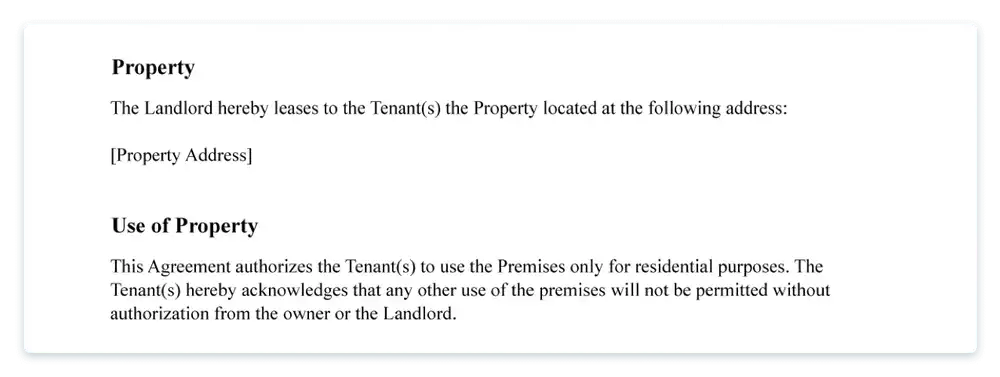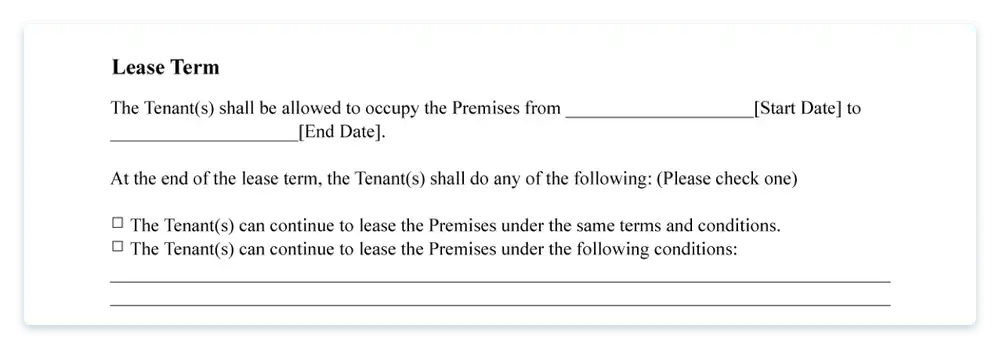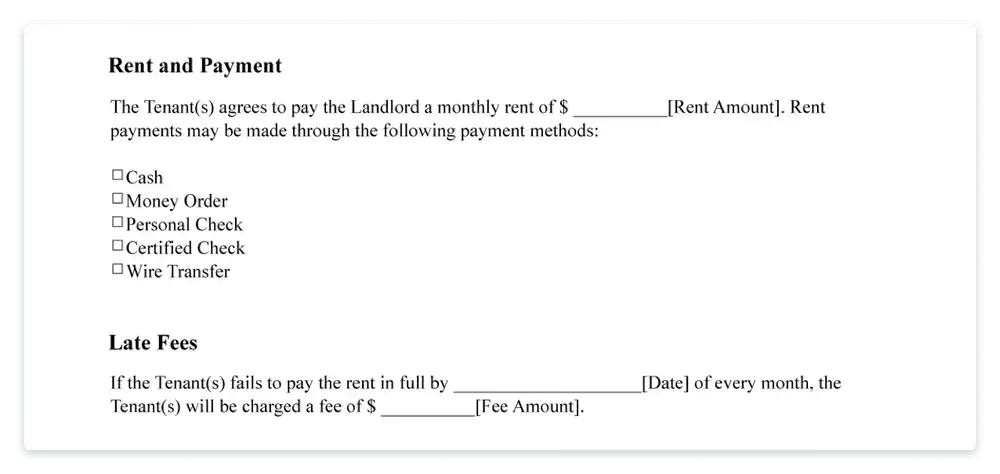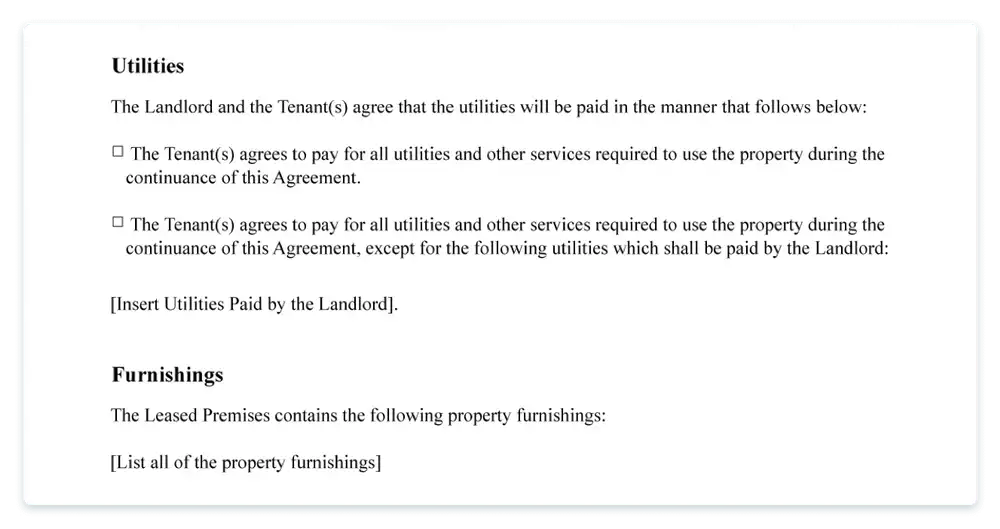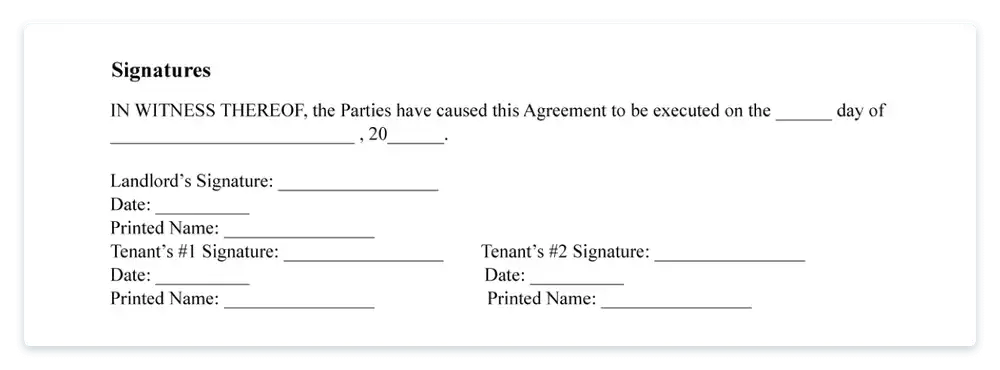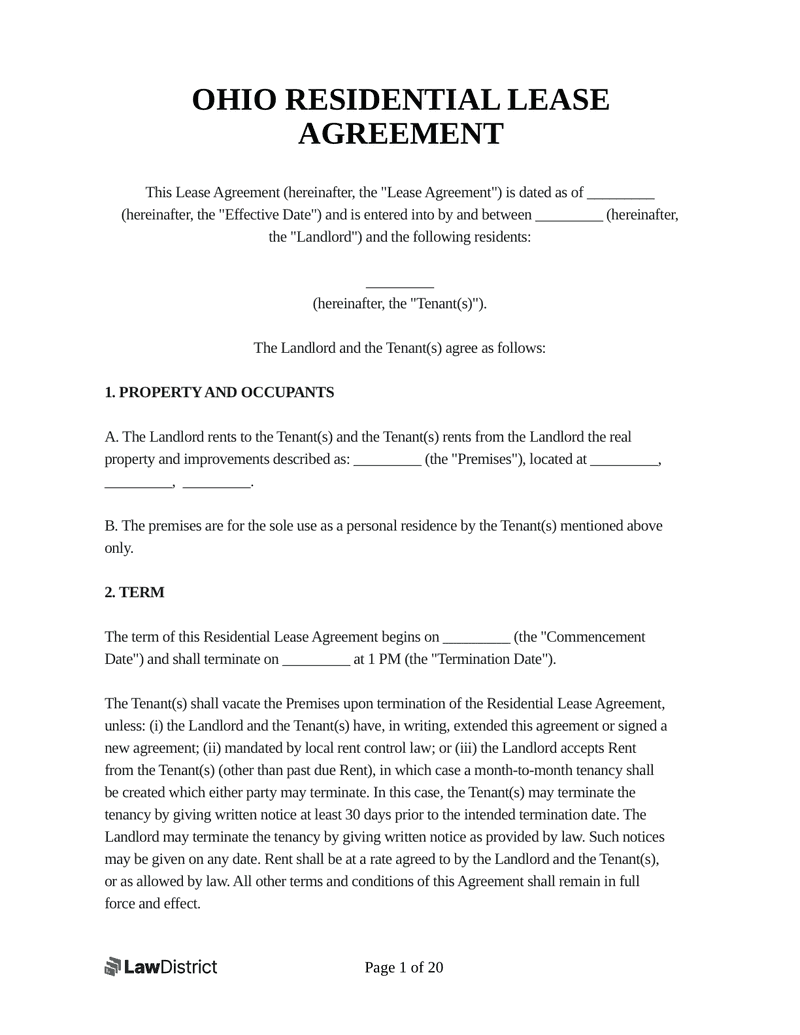OHIO
RESIDENTIAL LEASE AGREEMENT
This Lease Agreement (hereinafter, the "Lease Agreement") is dated as of _________ (hereinafter, the "Effective Date") and is entered into by and between _________ (hereinafter, the "Landlord") and the following residents:
_________
(hereinafter, the "Tenant(s)").
The Landlord and the Tenant(s) agree as follows:
1. PROPERTY
The Landlord rents to the Tenant(s) and the Tenant(s) rents from the Landlord a certain real property and improvements described below, according to the terms and conditions described in this Lease Agreement.
A house located at _________, _________, Ohio, _________ (hereinafter, the "Property").
Unless otherwise indicated in the Lease Agreement, no other portion of the building (hereinafter, the "Building") wherein the Property is located is included in the Lease Agreement.
2. TERM
The term of this Lease Agreement begins on _________ (hereinafter, the "Commencement Date") and shall terminate on _________ (hereinafter, the "Termination Date").
The Tenant(s) shall vacate the Property upon termination of the Lease Agreement, unless:
(i) The Landlord and the Tenant(s) have, in writing, extended this agreement or signed a new agreement.
(ii) The Landlord accepts Rent from the Tenant(s) (other than past due Rent), in which case a month-to-month tenancy shall be created which either party may terminate.
In this case, the Tenant(s) may terminate the tenancy by giving written notice at least 30 days prior to the intended Termination Date. The Landlord may terminate the tenancy by giving written notice as provided by law. Such notices may be given on any date. Rent shall be at a rate agreed to by the Landlord and the Tenant(s), or as allowed by law. All other terms and conditions of this Lease Agreement shall remain in full force and effect.
3. MANAGEMENT
The Tenant(s) is hereby notified that the Owner or Landlord _________ is the Property Manager in charge of repairs or maintenance of the Property.
If the Tenant(s) has any complaint regarding any issue about the Property, _________ shall be contacted by one of the following methods:
Address: _________
Telephone: _________
Email: _________
4. RENT
The Tenant(s) shall pay the Landlord monthly Rent in the amount of $_________ (hereinafter, the "Rent") for each full month during this lease.
The full month's Rent is due and payable not later than the 1st day of each month lease period.
The Landlord shall not increase the Rent during the term of a lease. However, the Landlord may increase the Rent by giving at least a 30 days written notice to the Tenant(s). The Rent increase shall not be effective until 30 days from the next date Rent is due.
Please Take Notice that mail delays will not excuse the Tenant(s)'s obligation to pay the Rent on time.
Place of Payment:
The Tenant(s) shall remit all Rent payment amounts owed to the Landlord under this Lease Agreement to the following address:
_________
The Landlord may change the person and place to which the Tenant(s) must remit the rental amounts due under this Lease Agreement.
Please Take Notice that you must place the Property address and the Tenant(s)'s name on all payments.
Method of Payment:
The Tenant(s) shall pay all Rent by selecting any of the following forms of payment (select one or more):
5. OCCUPANTS
During the term of this Lease Agreement, the only individuals the Tenant(s) may permit to reside on the Property are the following:
_________
6. KEYS/LOCKS
Upon the Commencement Term of the Lease Agreement, the Landlord agrees to give the Tenant(s) _________ set(s) of keys for the Property, the common areas of the Property, and the mailbox. The Landlord shall only authorize the Tenant(s) to have duplicate copies of the keys with his prior consent.
At the end of this Lease Agreement, all-access provided to the Tenant(s) shall be returned to the Landlord, or a monetary fee will be charged to the Tenant(s) or will be subtracted from the Security Deposit.
The Tenant(s) is prohibited from adding locks to, changing, or in any way altering locks installed on the doors without first obtaining the Landlord's prior written consent. If, with the Landlord's prior written consent, the Tenant(s) proceeds to change or alter existing locks, then said Tenant(s) shall provide the Landlord with keys to any changed lock immediately up installation. The Tenant(s) shall pay for the costs of any new keys or opening devices.
7. MAINTENANCE
The Landlord shall maintain the Property at all times and perform all repairs reasonably necessary. The primary duty of the Landlord shall be to meet the implied warranty of habitability of the Property, that is, that the Property is in a fit, livable condition.
Additionally, during the term of this Lease Agreement and any renewal thereof, the Tenant(s) shall:
(1) Keep the Property clean and safe, use all electrical, plumbing, heating, ventilating, and air conditioning facilities and appliances in a reasonable manner.
(2) Repair any damage arising from the act or negligence of the Tenant(s), Occupants, or guests, agents, visitors, and invitees, at the Tenant(s)'s expense.
(3) Surrender the Property in as good order and condition as when received, reasonable wear and tear excepted, upon the termination of this Lease Agreement.
(4) Immediately notify the Landlord, in writing, of any problem, malfunction or damage; otherwise, the Tenant(s) will be liable for the costs of any such damage, which might have been avoided had the Tenant(s) promptly notified the Landlord of the defect.
8. REPAIRS
All requests for repairs must be in writing and delivered to the Landlord. The Tenant(s) may call the Landlord to request repairs only in the event of an emergency related to the condition of the Property that materially affects the physical health or safety of an ordinary tenant.
In the event that the Landlord has knowledge that the Property is in need of emergency repairs, reasonable notice of the Landlord's intent to enter the Property must be given to the Tenant(s) and, in such case, shall only enter at reasonable times. Twenty-four hours is presumed to be a reasonable notice in the absence of evidence to the contrary.
Under ordinary circumstances, the Tenant(s) may not repair or cause to be repaired any condition, regardless of the cause, without the Landlord's permission. All decisions regarding repairs, including the completion of any repair, whether to repair or replace the item, and the selection of contractors, will be at the Landlord's sole discretion.
The Landlord does not have a duty to repair or remedy a condition if:
(1) The Tenant(s) is delinquent in Rent at the time a repair notice is given.
(2) The condition was caused by the Tenant(s), a member of the Tenant(s)'s family, or a guest or invitee of the tenant (unless the condition was caused by normal wear and tear).
The Parties agree that _________ day(s) is a reasonable period of time for the Landlord to make a diligent effort to repair a condition unless there are circumstances that establish that a different period of time is appropriate (such as the severity and nature of the condition and the availability of materials, labor, and utilities).
If in an emergency it becomes necessary to make any repairs or replacements by the Tenant(s) without prior written consent from the Landlord, at Landlord's expenses, and such repairs or replacements are found to be unsatisfactory and to have caused additional damages, the Tenant(s) shall reimburse Landlord for the cost of making such repairs.
9. UTILITIES AND SERVICES
The Tenant(s) shall be solely responsible for and shall pay expenses for all utilities and services used or consumed at the Property.
10. FAILURE OF TENANT TO FULFILL OBLIGATIONS
In accordance with the Ohio Revised Code §5321:
(i) If the Tenant(s) fails to pay rent or to comply with any material provision of this Lease Agreement, or materially fails to comply with any duties imposed on the Tenant(s) by state law, the Landlord may terminate the Tenant(s)'s right to use and to occupy the Property by providing at least THREE (3) days written Notice to Quit.
(ii) If the Tenant(s) violates division (A)(9) of section 5321.05 of the Ohio Revised Code and if the Landlord has actual knowledge of or has reasonable cause to believe that the Tenant(s), any person in his or her household, or any person on the residential premises with the consent of the Tenant(s) previously has or presently is engaged in a violation as described in division (A)(6)(a)(i) of section 1923.02 of the Ohio Revised Code, the Landlord shall terminate the Lease Agreement by giving a THREE (3) days' notice of termination in accordance with the Ohio Revised Code.
(iii) If the Tenant(s) fails to comply with any other material provision of the Ohio Revised Code or this Lease Agreement, the Landlord may, (a) terminate the Tenant(s)'s right to use and to occupy the Property by providing at least THIRTY (30) days written Notice to Quit; or (b) choose to allow the Tenant(s) to cure such default and the cost be added to the Tenant(s) overall financial obligation, declare the entire balance of Rent payable hereunder to be immediately due and payable.
The rights provided by this paragraph are cumulative in nature and are in addition to any other rights afforded by law.
Please note the Landlord shall have the right to bring an action under Ohio Revised Statute § 1923 for possession of the Property as a result of any act or situation outlined in § 5321.03(A).
11. LANDLORD AND TENANT RESPONSIBILITIES
In addition to any duties imposed on the Landlord and the Tenant(s) as described above, the Parties agree to comply with all their respective obligations and responsibilities in accordance with §§ 5321.04 and 5321.05 of the Ohio Revised Code.
12. HAZARDOUS MATERIALS
The Tenant(s) shall not keep or have on the Property any article or item of a dangerous, flammable, or explosive material on the Property that might unreasonably increase the danger of fire or explosion on the Property or that might be considered hazardous or extra hazardous by any responsible insurance company.
13. LANDLORD ACCESS TO PROPERTY
The Landlord and the Landlord's agents shall have the right at all reasonable times, and by all reasonable means during the term of this Lease Agreement and any renewal thereof, to enter the Property for the following purposes:
(i) Survey the Property's condition and take photographs to document the condition.
(ii) Make repairs or improvements to the Property.
(iii) Supply agreed services.
(iv) Show the Property to prospective buyers or tenants.
(v) Exercise a contractual or statutory lien.
(vi) Leave a written notice.
(vii) Seize nonexempt property if the Tenant(s) is in default.
Except in case of emergency, the Landlord will give the Tenant(s) reasonable notice of intent to enter. For these purposes, twenty-four (24) hour written notice will be deemed reasonable.
14. ASSIGNMENT/SUBLETTING
The Tenant(s) shall not voluntarily or involuntarily assign, mortgage, encumber or hypothecate this Lease or any interest herein or sublet the Property or any part thereof.
The Tenant(s) is specifically prohibited from offering all or part of the Property for short-term rentals such as through Airbnb, VRBO, or other such sites or programs. Any advertising or on-line postings, as well as actual rentals of the Property to vacation or short-term guests, shall constitute a material breach of this Lease Agreement.
Any person who is not a Tenant who occupies any portion of the Property, for any period of time whatsoever, for any compensation or consideration whatsoever (including, without limitation, the payment of money and/or trade and/or barter of other goods, services, or property occupancy rights) is NOT a guest, and such occupancy constitutes unauthorized subletting or assignment which is a substantial and material breach of this Lease Agreement.
15. NOTICES
Notice required by statute will be given in accordance with the applicable statute. All other notices shall be deemed sufficient if made as follows:
- All notices to the Landlord shall be directed by personal delivery or first-class mail to the Landlord at the appropriate address set forth below, until the Tenant(s) is notified, in writing, to the contrary.
- All notices to the Tenant(s) shall be directed by personal delivery or first-class mail to Tenant at the Leased Property or any forwarding address provided in writing by the Tenant(s) to the Landlord.
- The addresses set forth below may be changed by the Parties by giving notice as set forth herein.
Landlord:
_________
_________
Tenant:
_________
_________, _________, Ohio _________
Such addresses may be changed from time to time by any party by providing notice as set forth above.
16. GOVERNING LAW
This Lease Agreement shall be governed, construed, and interpreted by the Laws of the State of Ohio.
IN WITNESS WHEREOF, the Landlord and Tenant(s) have executed this Lease Agreement in the manner prescribed by law as of the Effective Date.
Landlord:
By: ___________________________________ Date: __________________
_________
Tenant:
By: ___________________________________ Date: __________________
_________
Ohio Lease Agreement
Inspection Checklist
Address: _________, _________, Ohio _________
The Tenant(s) has inspected the Property and states that the Property is in satisfactory condition, free of defects, except as noted below:
| SATISFACTORY | COMMENTS |
| Bathrooms | _________ | _________________________ |
| Carpeting | _________ | _________________________ |
| Ceilings | _________ | _________________________ |
| Closets | _________ | _________________________ |
| Countertops | _________ | _________________________ |
| Dishwasher | _________ | _________________________ |
| Disposal | _________ | _________________________ |
| Doors | _________ | _________________________ |
| Fireplace | _________ | _________________________ |
| Lights | _________ | _________________________ |
| Locks | _________ | _________________________ |
| Refrigerator | _________ | _________________________ |
| Screens | _________ | _________________________ |
| Stove | _________ | _________________________ |
| Walls | _________ | _________________________ |
| Windows | _________ | _________________________ |
| Window coverings | _________ | _________________________ |
| _________ | _________ | _________________________ |
| _________ | _________ | _________________________ |
_____________________
Date
Tenant:
By: ___________________________________ Date: __________________
_________
Acknowledged by Landlord:
By: ___________________________________ Date: __________________
_________

